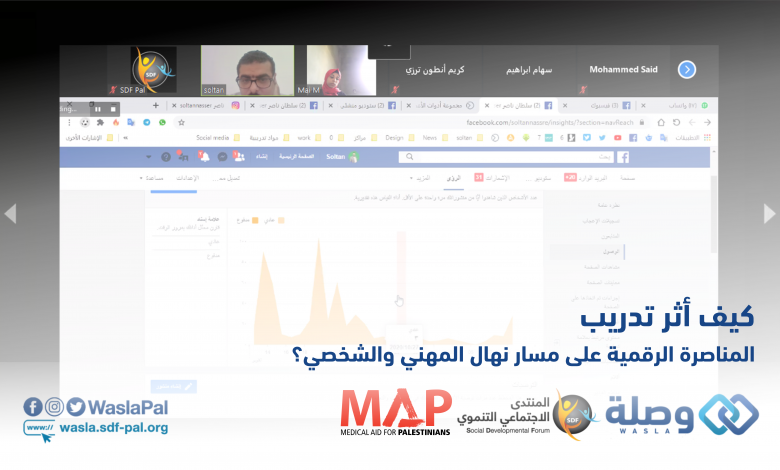How did the Digital Advocacy training impacted Nihal’s personal and professional paths?

I never realized the importance of advocacy as an effective tool in the implemented campaigns and projects.
With this quotation Nihal expressed her impression on the digital advocacy training conducted by the Social Developmental Forum targeting partner institutions. This comes within the work of “Improving Local Response for the Advocacy of the Rights of People with Disabilities – WASLA – Phase 2” project in partnership with the Medical Aid for Palestinians_ MAP. Nihal added, “This training gave me the opportunity to invest in advocacy as a tool to advocate the rights of people with disabilities”.
Nihal, 37, works as a Projects Manager at the “Right to Live” and she perceives her participation in the conducted training an 8-day valuable opportunity that honed her skills and personality.
Describing her experience, Nihal said, “The training was a great experience. The greatest was how to utilize digital tools in advocacy and lobbying to support the rights of people with disabilities. This, therefore, gave me the tools needed to plan and implement digital advocacy campaigns. In addition to marketing programs and projects using digital tools, which comprises the recent work trends of institutions and donors”.
She added, “I could notice the improvement in my skills pre- and post-the training. Now, I can develop a digital advocacy campaigns to advocate the rights of down syndrome children besides raising awareness about their rights to health, education and work using the appropriate digital tools. Using these tools ensure wide spread to their issues where stakeholders and decision makers can be reached”.
Of the positive impact the training had on Nihal’s career path is the inclusion of digital tools when submitting project’s proposals focused on down syndrome children, whereas previously, she used to heavily rely on workshops, billboards, podcasts…etc. This is due to her realization of the efficiency and effectiveness of digital tools in achieving the outcomes of these activities within the local context of the Palestinian society.
“The training was very interactive,” said Nihal in her description of the training. She added, “We were used to face-to-face trainings as they are usually more interactive than online trainings. However, this training was very interactive as many PowerPoint presentations and practical application were heavily relied on.” The utilization of digital tools was conceived by Nihal as major actors to the training success although it was conducted virtually.
Nihal concluded”, I improved my skills, refined my personality, increased my knowledge, and expanded my networks. Thank you, WASLA for this unique experience.”

